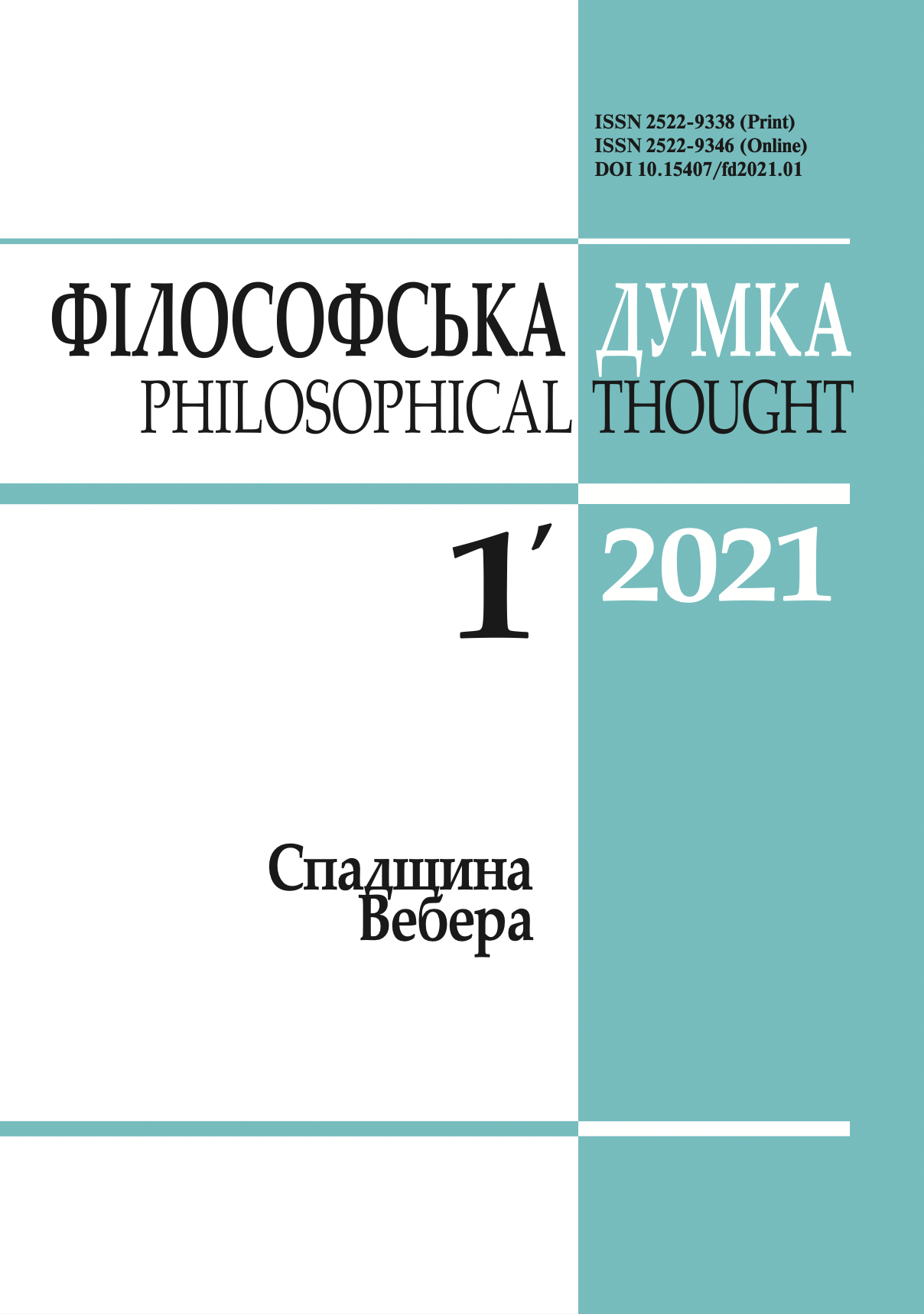Макс Вебер і сучасна плебісцитарна демократія
Спадщина Вебера: на перехресті традицій
DOI:
https://doi.org/10.15407/fd2021.01.135Ключові слова:
Макс Вебер, демократія, плебісцитарний лідер, леґітимність, плебісцитАнотація
У статті запропоновано інтерпретацію однієї з найсуперечливіших концепцій Макса Вебера – концепції плебісцитарної лідерської демократії (Führerdemokratie). Зокрема, розглянуто погляди Вебера щодо парламенту і ставлення до демократії, питання про те, чому типи леґі- тимного панування не включають в себе демократичну леґітимність, і зв’язок концепції плебісцитаризму з Веберовою теорією бюрократії.
Виклад не обмежений суто історико-філософським аналізом поглядів Вебера. Головна мета полягає в тому, щоб показати, як ідеї вченого знову стають актуальними у сучасності. Веберівський концепт плебісцитарної демократії може слугувати як інструментом аналізу перекручень, породжених кризою традиційної партійної політики в усталених демократіях, так і для опису сучасних персоналістських режимів, леґітимність яких реґулярно підтвер- джується на всенародних виборах національного лідера.
Посилання
Beetham, D. (1987). Beaurocracy. Minneapolis: University of Minnesota Press.
Breuer, S. (1998). The Concept of Democracy in Weber's Political Sociology. In: R. Schroeder (Ed.). Max Weber, Democracy and Modernization (pp. 1-13). Basingstoke: Macmillan.
https://doi.org/10.1007/978-1-349-26836-8_1
PMid:9546111
de Beus, J. (2011). Audience Democracy: An Emerging Pattern in Postmodern Political Commu- nication. In: K. Brants, K. Voltmer (Eds.). Political Communication in Postmodern Democracy. London: Palgrave, Macmillan.
https://doi.org/10.1057/9780230294783_2
Dalton, R. J. (2004). Democratic Challenges, Democratic Choices: The Erosion of Political Support in Advanced Industrial Democracies. Oxford: Oxford University Press.
https://doi.org/10.1093/acprof:oso/9780199268436.001.0001
Eliaeson, S. (1991). Between Ratio and Charisma - Max Weber's Views on Plebiscitary Leadership Democracy. Statsvetenskaplig Tidskrift, 94, 317-339.
Colin Hay, C. (2007). Why We Hate Politics. Cambridge: Polity Press.
Green, J. E. (2010). The Eyes of the People: Democracy in an Age of Spectatorship. Oxford, England: Oxford University Press.
Körösényi, A. (2019). The Theory and Practice of Plebiscitary Leadership: Weber and the Orbánregime. East European Politics and Societies: and Cultures, 33 (2), 280-301.
https://doi.org/10.1177/0888325418796929
Loewenstein, K. (1961). Max Weber als «Ahnherr» des plebiszitären Führerstaates. Kölner Zeitschrift für Soziologie und Sozialpsychologie, 13, 275-89.
Mair, P. (2013). Ruling the Void: The Hollowing of Western Democracy. New York: Verso. Maley, T. (2011). Democracy and the Political in Max Weber's Thought. Toronto: University of Toronto Press.
Mandel, D. (2005). "Managed democracy": Capital and state in Russia. Debatte: Journal of Contemporary Central and Eastern Europe, 13 (2), 117-136.
https://doi.org/10.1080/09651560500306762
Manin, B. (1997). The Principles of Representative Government. Cambridge: Cambridge University Press.
https://doi.org/10.1017/CBO9780511659935
Mommsen, W. (1984). Max Weber and German Politics, 1890-1920. Chicago: The University of Chicago Press.
Mommsen, W. (1989). The Political and Social Theory of Max Weber. Chicago: The University of Chicago Press.
Rogov, K. (2015). Triumphs and Crises of Plebiscitary Presidentialism. In: L. Aron (Ed.). Putin's Russia: How It Rose, How It Is Maintained, and How It Might End (pp. 83-105). Washington, DC: American Enterprise Institute.
Schmitt, K. (2008). Constitutional Theory (1928). Transl. and ed.: J. Seitzer. Durham: Duke Uni- versity Press.
https://doi.org/10.1215/9780822390589
Senigaglia, C. (2011). Max Weber and the parliamentary bureaucracy of his time. Parliaments, Estates and Representation, 31 (1), 53-66.
https://doi.org/10.1080/02606755.2011.560753
Senigaglia, C. (2020). Weber's Concern on Immediate Democracy and the Mediation of Parlia- ment. Redescriptions: Political Thought, Conceptual History and Feminist Theory, 23 (1), 20-35.
https://doi.org/10.33134/rds.327
Tormey, S. (2015). The End of Representative Politics. Cambridge: Polity Press.
Urbinati, N. (2014). Democracy Disfigured: Opinion, Truth, and the People. Harvard University Press.
https://doi.org/10.4159/harvard.9780674726383
Weber, M. (1917-1918). Parlament und Regierung im neugeordneten Deutschland. MWG I/15:421-596.
Weber, M. (1922) Wirtschaft und Gesellschaft. Grundriss der verstehenden Soziologie. Tübingen: Mohr.
Weber, M. (1924) Gesammelte Aufsätze zur Soziologie und Sozialpolitik. Tübingen: Mohr.
Weber, M. (1971). Gesammelte politische Schriften. Tübingen: Mohr.
Zakaria, F. (1997). The Rise of Illiberal Democracy. Foreign Affairs, 76 (6), 22-43.
##submission.downloads##
-
PDF
Завантажень: 569
Опубліковано
Як цитувати
Номер
Розділ
Ліцензія
Автори, які публікуються у цьому журналі, згодні з наступними умовами:
- Автори зберігають авторське право і надають журналу право першої публікації.
- Автори можуть укладати окремі, додаткові договірні угоди з неексклюзивного поширення опублікованої журналом версії статті (наприклад, розмістити її в інститутському репозиторії або опублікувати її в книзі), з визнанням її первісної публікації в цьому журналі.
- Авторам дозволяється і рекомендується розміщувати їхню роботу в Інтернеті (наприклад, в інституційних сховищах або на їхньому сайті) до і під час процесу подачі, так як це може привести до продуктивних обмінів, а також скорішого і ширшого цитування опублікованих робіт (див. вплив відкритого доступу).


